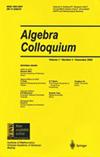量子群Uq(sl3)的多项式模
IF 0.4
4区 数学
Q4 MATHEMATICS
引用次数: 0
摘要
设[公式:见文]为具有Cartan子代数的有限维复单李代数[公式:见文]。那么,当且仅当[Formula: see text]的类型为[Formula: see text]或[Formula: see text]时,[Formula: see text]具有[Formula: see text]-模块结构;这叫做第1阶的多项式模。在量子版本中,[公式:见文本]上的1阶多项式模块已被分类。本文证明了量子群[公式:见文]不存在秩一多项式模。本文章由计算机程序翻译,如有差异,请以英文原文为准。
The Polynomial Modules over Quantum Group Uq(sl3)
Let [Formula: see text] be a finite dimensional complex simple Lie algebra with Cartan subalgebra [Formula: see text]. Then [Formula: see text] has a [Formula: see text]-module structure if and only if [Formula: see text] is of type [Formula: see text] or of type [Formula: see text]; this is called the polynomial module of rank one. In the quantum version, the rank one polynomial modules over [Formula: see text] have been classified. In this paper, we prove that the quantum group [Formula: see text] has no rank one polynomial module.
求助全文
通过发布文献求助,成功后即可免费获取论文全文。
去求助
来源期刊

Algebra Colloquium
数学-数学
CiteScore
0.60
自引率
0.00%
发文量
625
审稿时长
15.6 months
期刊介绍:
Algebra Colloquium is an international mathematical journal founded at the beginning of 1994. It is edited by the Academy of Mathematics & Systems Science, Chinese Academy of Sciences, jointly with Suzhou University, and published quarterly in English in every March, June, September and December. Algebra Colloquium carries original research articles of high level in the field of pure and applied algebra. Papers from related areas which have applications to algebra are also considered for publication. This journal aims to reflect the latest developments in algebra and promote international academic exchanges.
 求助内容:
求助内容: 应助结果提醒方式:
应助结果提醒方式:


